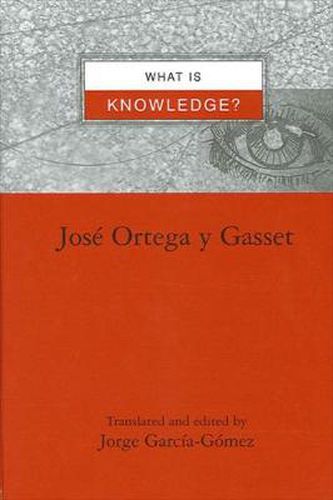Readings Newsletter
Become a Readings Member to make your shopping experience even easier.
Sign in or sign up for free!
You’re not far away from qualifying for FREE standard shipping within Australia
You’ve qualified for FREE standard shipping within Australia
The cart is loading…






Appearing in English for the first time, this book comprises two of Ortega’s most important works, ‘Que es conocimiento? and the essay Ideas y creencias. This is Ortega’s attempt to systematically present the foundations of his metaphysics of human life and, on that basis, to provide a radical philosophical account of knowledge. In so doing, he criticizes idealism and overcomes it. Accordingly, this book goes well beyond a treatise on epistemology; in fact, as understood in modern philosophy, this discipline and its questions are shown to be derivative and, in that sense, they are transcended here by Ortega’s systematic effort. Written during the time of his maturity, these works are representative of his fruitful and radical period. Both 'Que es conocimiento? and Ideas y creencias are equally decisive not only for the understanding and radical completion of Ortega’s work, but also for their relevance to the work of continental philosophers during the same period and for years to come (e.g., Husserl, Jaspers, Heidegger, Sartre, and others).
$9.00 standard shipping within Australia
FREE standard shipping within Australia for orders over $100.00
Express & International shipping calculated at checkout
Appearing in English for the first time, this book comprises two of Ortega’s most important works, ‘Que es conocimiento? and the essay Ideas y creencias. This is Ortega’s attempt to systematically present the foundations of his metaphysics of human life and, on that basis, to provide a radical philosophical account of knowledge. In so doing, he criticizes idealism and overcomes it. Accordingly, this book goes well beyond a treatise on epistemology; in fact, as understood in modern philosophy, this discipline and its questions are shown to be derivative and, in that sense, they are transcended here by Ortega’s systematic effort. Written during the time of his maturity, these works are representative of his fruitful and radical period. Both 'Que es conocimiento? and Ideas y creencias are equally decisive not only for the understanding and radical completion of Ortega’s work, but also for their relevance to the work of continental philosophers during the same period and for years to come (e.g., Husserl, Jaspers, Heidegger, Sartre, and others).